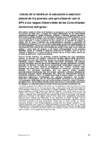Please use this identifier to cite or link to this item:
https://accedacris.ulpgc.es/jspui/handle/10553/76376
| Title: | Efecto de la familia en la educación e inserción laboral de los jóvenes: una aproximación con la EPA a los rasgos diferenciales de las Comunidades Autónomas bilingües | Authors: | Cañada Vicinay, Juan Antonio | UNESCO Clasification: | 531204 Educación | Keywords: | Familia Educación Trabajo juvenil |
Issue Date: | 1999 | Journal: | Ekonomiaz | Abstract: | Este trabajo analiza el efecto de la familia en la educación y en la inserción laboral de los jóvenes de cada sexo, y explora los rasgos diferenciales de las Comunidades autónomas bilingües en catalán (Baleares, Cataluña y Valencia), euskera (Navarra y País Vasco) y gallego (Galicia). Los resultados obtenidos con la EPA sintonizan con la teoría económica de la familia sobre cantidad y calidad de hijos y además, muestran mayor educación y menor presencia de las mujeres en el mercado de trabajo, al tiempo que se hacen uniformes los comportamientos laborales y aumentan las diferencias en educación con los varones. Igualmente, se aprecian singularidades en las CCA bilingües, aunque por razones ajenas al bilingüismo: (i) menor fertilidad, (ii) escolarización más corta en las comunidades del catalán y más larga en las áreas del gallego y sobre todo del euskera, y (iii) mayor heterogeneidad en los procesos laborales, donde se constata la temprana inserción en Cataluña, pero no así en Valencia y Baleares, y el tardío acceso al empleo fijo en el País Vasco donde los jóvenes parecen sufrir mayor precariedad. This work analyses the effect of the family as an institution in the education of young people of both sexes and in their access to Jobs. It also explores the differential features of the bilingual autonomous Communities in Catalan (Baleares, Cataluña and Valencia), Basque (Navarra and País Vasco) and Galician (Galicia). The results obtained with the Labour Force Survey (EPA) concords with the family economic theory on quantity and quality of children and, furthermore, they denote higher level of education and smaller presence of women in the labour market. At he same time, occupational behaviours become more uniform and differences in the education of males increase. Certain singularities are appreciated in the bilingual autonomous communities, albeit for reasons that have nothing to do with bilingualism. These are: (i) lower fertility, (ii) shorter schooling periods in the Catalan-speaking communities and longer schooling in the Galician-speaking and above all, Basque-speaking communities and (iii) a greater heterogeneity in the occupational processes: it is verified that a youth will manage to get a Job sooner in Catalonia and much later in the Basque Country, where young people seem to suffer from a greater job-precariousness. |
URI: | https://accedacris.ulpgc.es/handle/10553/76376 | ISSN: | 0213-3865 | Source: | Ekonomiaz: Revista vasca de economía [ISSN 0213-3865], n. 43, p. 58-91 | URL: | http://dialnet.unirioja.es/servlet/articulo?codigo=273412 |
| Appears in Collections: | Artículos |
Page view(s)
38
checked on Jan 10, 2026
Download(s)
9
checked on Jan 10, 2026
Google ScholarTM
Check
Share
Export metadata
Items in accedaCRIS are protected by copyright, with all rights reserved, unless otherwise indicated.
